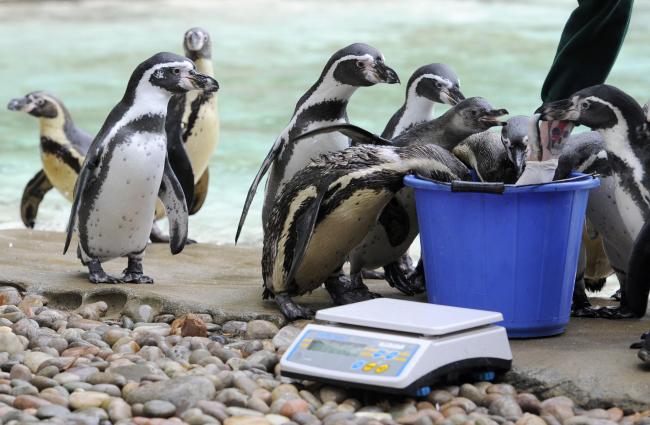
Tom Beasley, Trainee reporter
PENGUIN conservationists in Weymouth want residents to make wise choices when it comes to seafood.
Today marks World Penguin Day and staff at Weymouth Sea Life Adventure Park have stressed the importance of avoiding seafood that is fished through methods which have an impact on penguins.
The park has a colony of 14 Humboldt penguins, which are native to coastal regions of Chile and Peru.
Its breeding programme has produced 14 successful hatches to date, with 10 of the penguins sent out to take part in breeding programmes at other Sea Life parks in the UK.
Jo Mullen, aquarist at Weymouth Sea Life, said: "It’s mostly about education and we like to spread the message about penguins because I think they tend to be misunderstood.
"Everybody thinks of cold species, but there are only actually three types that live in snow and all of the others live in warmer climates.
"We like to spread the message that it’s not just about ice caps melting; it’s actually to do with overfishing and human interference."
The park offers visitors the chance to adopt one of the penguins in order to raise money for conservation efforts.

It also provides copies of the Marine Conservation Society's 'Good Fish Guide', which offers advice on the best fish to buy and the most ethical places from which to buy it.
"It’s not about not eating fish; it’s just about making the right choices," said Jo.
"Certain methods, like bottom trawling, are actually quite dangerous because they catch a lot of other creatures – not just the target animal.
"For example, prawns are bottom trawled and for every pound of prawns, they can catch up to 4lbs of other aquatic species.
"Sustainable fishing is just about knowing where your fish comes from and buying locally if you can."
All species of penguins are vulnerable in the wild, largely as a result of overfishing by humans.
Jo added: "They are fantastic little creatures because they’ve got big personalities and they’re monogamous, so they tend to mate for life.
"They’re pretty good mums and dads, so one will sit on the eggs and the other will go and get food.
"When the chick hatches, they will spend up to two months sitting on the chicks themselves to look after them."
"They’re a bit like humans in that they care a lot for their children.
"They’re very dedicated and I think that in itself is really endearing."
source
Today marks World Penguin Day and staff at Weymouth Sea Life Adventure Park have stressed the importance of avoiding seafood that is fished through methods which have an impact on penguins.
The park has a colony of 14 Humboldt penguins, which are native to coastal regions of Chile and Peru.
Its breeding programme has produced 14 successful hatches to date, with 10 of the penguins sent out to take part in breeding programmes at other Sea Life parks in the UK.
Jo Mullen, aquarist at Weymouth Sea Life, said: "It’s mostly about education and we like to spread the message about penguins because I think they tend to be misunderstood.
"Everybody thinks of cold species, but there are only actually three types that live in snow and all of the others live in warmer climates.
"We like to spread the message that it’s not just about ice caps melting; it’s actually to do with overfishing and human interference."
The park offers visitors the chance to adopt one of the penguins in order to raise money for conservation efforts.

It also provides copies of the Marine Conservation Society's 'Good Fish Guide', which offers advice on the best fish to buy and the most ethical places from which to buy it.
"It’s not about not eating fish; it’s just about making the right choices," said Jo.
"Certain methods, like bottom trawling, are actually quite dangerous because they catch a lot of other creatures – not just the target animal.
"For example, prawns are bottom trawled and for every pound of prawns, they can catch up to 4lbs of other aquatic species.
"Sustainable fishing is just about knowing where your fish comes from and buying locally if you can."
All species of penguins are vulnerable in the wild, largely as a result of overfishing by humans.
Jo added: "They are fantastic little creatures because they’ve got big personalities and they’re monogamous, so they tend to mate for life.
"They’re pretty good mums and dads, so one will sit on the eggs and the other will go and get food.
"When the chick hatches, they will spend up to two months sitting on the chicks themselves to look after them."
"They’re a bit like humans in that they care a lot for their children.
"They’re very dedicated and I think that in itself is really endearing."
source


















No comments:
Post a Comment